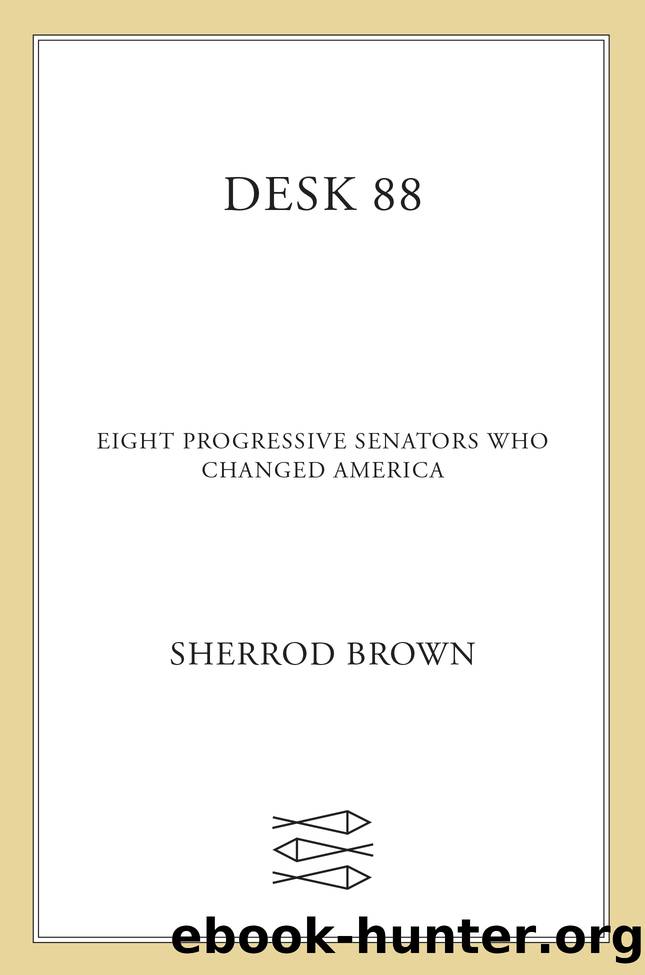Desk 88 by Sherrod Brown

Author:Sherrod Brown
Language: eng
Format: epub
Publisher: Farrar, Straus and Giroux
* * *
WEALTHY BUSINESS INTERESTS dominated southern politics more than in any region of the country. In 1895 a Massachusetts company opened a factory in Alabama to escape strikes and other labor-management problems, but only after the Alabama legislature repealed its 1887 child labor law. In 1901, the Alabama legislature, in reaction to the resurgent Populist movement, rewrote its state constitution to make it harder for poor whites to vote and nearly impossible for blacks to vote.
But it started way earlier than that. When the Texas governor and two-time presidential candidate Rick Perry suggested that Texas might consider secession because of Obamacare, immigration policy, and other federal actions, he was tapping into a long southern tradition. The ideas of nullification and secession have been around the South almost as long as the nation has existed. The Tories—those loyal to Britain during the Revolutionary War—were overrepresented among southern business interests, especially the major plantation owners. Before the Civil War, a South Carolina state convention, influenced by their powerful senator John Calhoun, adopted a provision to nullify tariffs enacted by the United States Congress. To Calhoun and the nullifiers, their states’ rights and their personal liberties would allow them to nullify any federal law with which they didn’t agree; they could secede if necessary. If the South isn’t protected by nullification, Calhoun argued, “they must in the end be forced to rebel, or submit to have their permanent interests sacrificed, their domestic institutions subverted.” Therefore, the South Carolinian asserted, “The right of interposition … be it called what it may—State-right, veto, nullification, or by any other name—I conceive to be the fundamental principle of our system.” Calhoun’s philosophy, stripped of its intellectual veneer, was principally a defense of slavery and the southern planters.
The South’s view that it should have special privileges began even earlier than Calhoun’s intellectual gymnastics. The South has always had inordinate power in our federal government, beginning, not to put too fine a point on it, at the beginning. For fifty of the first seventy-two years of the United States Constitution—from George Washington’s inauguration until the South seceded in 1861—the president of the United States was a southern slaveholder.7
Ensuring that our government—from the beginning—would speak with an upper-class accent, Virginia’s James Madison argued for the creation of a more conservative Senate that could protect plantation owners and other elites. At the 1787 Constitutional Convention, he observed that our government should “be so constituted as to protect the minority of the opulent against the majority … If elections were open to all classes of people, the property of landed proprietors would be insecure.”
In 1800 Thomas Jefferson would have lost the electoral college to President John Adams if slaveholding states had not been rewarded for their chattel; we all remember from high school that our Founding Fathers had decided that slaves, who of course enjoyed few of the benefits of personhood and none of the benefits of citizenship, counted as three-fifths of a human being for the purposes of increasing the number of congressional districts and electoral votes for the slaveholding states.
Download
This site does not store any files on its server. We only index and link to content provided by other sites. Please contact the content providers to delete copyright contents if any and email us, we'll remove relevant links or contents immediately.
| Anarchism | Communism & Socialism |
| Conservatism & Liberalism | Democracy |
| Fascism | Libertarianism |
| Nationalism | Radicalism |
| Utopian |
The Secret History by Donna Tartt(16606)
The Social Justice Warrior Handbook by Lisa De Pasquale(11485)
Thirteen Reasons Why by Jay Asher(7779)
This Is How You Lose Her by Junot Diaz(5753)
Weapons of Math Destruction by Cathy O'Neil(5027)
Zero to One by Peter Thiel(4816)
The Myth of the Strong Leader by Archie Brown(4785)
Promise Me, Dad by Joe Biden(4439)
Stone's Rules by Roger Stone(4410)
Beartown by Fredrik Backman(4399)
How Democracies Die by Steven Levitsky & Daniel Ziblatt(4392)
The Fire Next Time by James Baldwin(4336)
100 Deadly Skills by Clint Emerson(4070)
A Higher Loyalty: Truth, Lies, and Leadership by James Comey(4024)
Rise and Kill First by Ronen Bergman(4008)
The David Icke Guide to the Global Conspiracy (and how to end it) by David Icke(3875)
The Farm by Tom Rob Smith(3869)
Secrecy World by Jake Bernstein(3773)
The Doomsday Machine by Daniel Ellsberg(3725)
